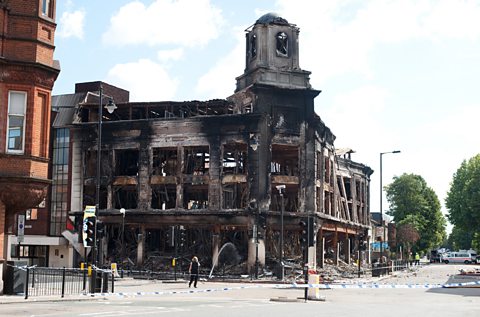The growth of crime in the 20th and 21st centuries
The crime rate increased in the 20th century, particularly after the 1960s. Many new crimes have emerged due to the rapid technological, social and economic changes.
Car crime
There are many crimes linked with cars. They include:
- dangerous and careless driving
- parking violations
- speeding
- car theft
- road rage
- joyrideStealing a car and driving it around at speed in a reckless way.
- car-jacking
- driving without a licence, insurance, road tax or MOT
- failing to stop after or report an accident
- drink driving
- refusing to give a breath test
- not wearing a seatbelt
- using a hand held mobile phone
Technology crime
Cybercrime refers to crime or illegal activity on the internet.
| Crime | Activity |
| Hacking | Accessing other people's or organisation's files and/or databases. |
| Fraud | Stealing from a person, for example stealing from their bank account online, or using someone elseŌĆÖs credit card details online. Fraud often involves identity fraud ŌĆō pretending to be someone else to access their bank accounts and credit cards. |
| Malicious software | Introducing a computer virus to destroy files or information on someone elseŌĆÖs computer. Sometimes the software is delivered via a phishing scam ŌĆō using spoof emails with links to the malware. |
| Crime | Hacking |
|---|---|
| Activity | Accessing other people's or organisation's files and/or databases. |
| Crime | Fraud |
|---|---|
| Activity | Stealing from a person, for example stealing from their bank account online, or using someone elseŌĆÖs credit card details online. Fraud often involves identity fraud ŌĆō pretending to be someone else to access their bank accounts and credit cards. |
| Crime | Malicious software |
|---|---|
| Activity | Introducing a computer virus to destroy files or information on someone elseŌĆÖs computer. Sometimes the software is delivered via a phishing scam ŌĆō using spoof emails with links to the malware. |
Computers have also allowed new ways for criminals to commit old crimes.
| Crime | Activity |
| Sexual crimes | The internet is used to meet and groom victims. The internet has also been used to share illegal images of abuse. |
| Cyberbullying | Threatening and abusive behaviour using the internet. |
| Theft | Computer, laptop, tablet and smartphone theft has increased. |
| Crime | Sexual crimes |
|---|---|
| Activity | The internet is used to meet and groom victims. The internet has also been used to share illegal images of abuse. |
| Crime | Cyberbullying |
|---|---|
| Activity | Threatening and abusive behaviour using the internet. |
| Crime | Theft |
|---|---|
| Activity | Computer, laptop, tablet and smartphone theft has increased. |
Drug-related crime
There are many crimes related to the increased use of illegal drugs in Britain.
- Drug trafficking/smuggling drugs into the country - sometimes done with drug 'mules'.
- Manufacture of drugs - such as cannabis are grown in 'farms'. Other drugs are 'cut' with other products before sale.
- Drugs gangs distribute drugs - often across large areas of the country. It is a criminal offence to be in possession of illegal drugs.
Violent crimes
Violent crimes tend to dominate media reports on crime and it increased in the late 20th century. Crimes include:
- Football hooliganism ŌĆō this rose sharply from the 1960s. Rival gangs of supporters plan to fight each other, or to attack or vandalise property at the local stations or on roads leading to the stadiums.
- Gun and knife crime - shootings and stabbings have happened, especially in London, but these crimes are rare.
- Riots - many riots occurred between 6-11 August 2011 in London and other cities. The trigger was the fatal shooting by police of Mark Duggan in London. Many shops were looted and fires started during the riots.

Terrorism
IRA
From the 1960s the IRA conducted shootings and bombings in Northern Ireland. They operated in Belfast and along the border between Northern Ireland and the Republic of Ireland. From the 1970s, the IRA also killed journalists and MPs in England.
In October 1984, the IRA tried to blow up the UK Cabinet and Prime Minister in the Grand Hotel in Brighton. In 1991 the IRA launched mortar bombs into Downing Street and in 1996 they bombed the Arndale shopping centre in Manchester.
Al-Qaeda
Terrorist cells linked to Al-Qaeda claimed responsibility for the London bombings on 7 July 2005. They bombed tube stations and a London bus, killing 52 people and injuring more than 700 others.